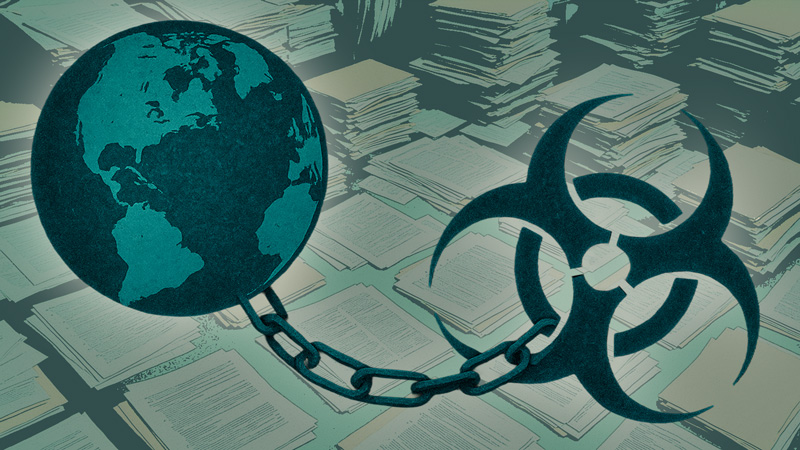Pandemic Treaty Perils: The PABS System

PABS Handout 2-pages
The Pathogen Access and Benefit Sharing (PABS) System and the WHO Biohub System
Does the passage of the WHO Pandemic Agreement on May 20, 2025 (“Treaty”), create the framework to usher in a new era of globalist control, masquerading as health care? Even though the United States and Argentina have withdrawn from the WHO, will all nations nevertheless be affected by its machinations? These questions are of critical concern.
Perhaps the most chilling aspect of the Treaty sets up the Pathogen Access and Benefit Sharing System (PABS) to “promot[e] the rapid and timely sharing of ‘materials and sequence information on pathogens with pandemic potential.’” (Article 12). This system will concentrate all the world’s most deadly pathogens into the hands of unelected, unaccountable bureaucrats under the influence of the pharmaceutical industry. The WHO will then share them with labs all over the world, ostensibly to develop vaccines, diagnostics and other therapeutics.
It is concerning that the details of how this system will function – its “modalities, legal nature, terms and conditions and operational dimensions” are not in the Pandemic Treaty itself. Rather, these “shall be developed and agreed in an instrument . . . as an annex.” (Article 12 (2)). In other words, the heart of the PABS system – and arguably, of the Treaty itself – has been left undefined. This Annex is currently being negotiated.
Meanwhile, the WHO and Switzerland have already established a partnership for a global “WHO BioHub System,” the purpose of which is “to create a fast and reliable system for sharing materials that could cause epidemics or pandemics.” This system poses a significant risk of escalating the chances of pandemics caused by lab leaks, as well as bio-terrorist attacks. These in turn will greatly increase the profits of the pharmaceutical industry and will give governments so inclined the pretext to keep people under lockdown and deprive them of their constitutional rights.
Under what authority did the WHO establish the WHO BioHub System? The Pandemic Treaty failed to make it to the floor for a vote at the May, 2024 World Health Assembly. Just a couple of weeks later, on June 13, 2024, the WHO issued the press release announcing the strengthening of the WHO BioHub System. At that time, the Treaty, which is supposed to govern the PABS System, would not be adopted for almost a year, and the negotiations on the Annex to set forth the details would not begin for more than a year. And yet, the WHO went right ahead and launched its BioHub System – originally in November of 2020 — doing what the PABS System is designed to do.
Since the WHO BioHub System preexists PABS, will it be governed by it? In the alternative, did the WHO commit an end-run around its member states, advancing the illusion that the member states will determine how PABS will be governed, when in reality, the WHO will do whatever it pleases, ultra vires, regardless of any Treaty or Annex?
Even though the U.S. and Argentina have withdrawn from the WHO, these nations will still be affected by the Pandemic Treaty – especially the constant stream of lab leaks that will likely result from the PABS and WHO BioHub systems. Pandemics know no borders. All nations will also be affected by whatever travel restrictions may be imposed by other countries, under the Treaty.
The Pandemic Treaty is dangerous on numerous fronts, and we need to continue to expose and oppose it, internationally. It is not a done deal. Even though the Treaty was adopted on May 20, 2025, it will not be open for signature until after the Annex articulating the details of the PABS system is also adopted – probably at the World Health Assembly in May of 2026. In addition, it will need to be ratified by at least 60 member nations. Therefore, failure either to come to agreement on the PABS annex or to reach 60 ratifications would stymie its entry into force.
Other nations should see the withdrawal of the U.S. and Argentina from the WHO as a clarion call and consider taking similar action. We need a consortium of free nations collaborating to address global health concerns, without the interference of the irredeemably corrupt World Health Organization.
About the Author. A graduate of Yale Law School, attorney Reggie Littlejohn is founder and president of Anti-Globalist International and Women’s Rights Without Frontiers. She is co-founder of the Sovereignty Coalition.
